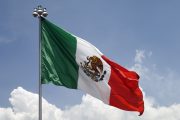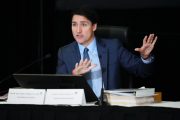
During his successful bid for the White House, President Donald Trump gave hope to many Americans that he was going to — as he put it himself — “put America First” when it came to trade deals, including the North American Free Trade Agreement (NAFTA). Trump called NAFTA “the worst trade deal maybe ever signed anywhere, but certainly ever signed in this country.”
This week, U.S. Trade Representative (USTR) Robert Lighthizer released the renegotiation objectives for a new NAFTA deal, and a close look at those objectives raises many concerns from Americans about U.S. business and jobs, and most critically, American national sovereignty.
The first renegotiation meetings are scheduled for August 16-20 in Washington, D.C.
In the introduction to the “Summary of Objectives for the NAFTA Renegotiation” released this week, we read, “Since the deal came into force in 1994, trade deficits have exploded, thousands of factories have closed, and millions of Americans have found themselves stranded, no longer able to utilize the skills for which they had been trained … In June 2016, then-candidate Donald J. Trump made a promise to the American people: he would renegotiate NAFTA or take us out of the agreement.”
Faced with that binary choice, it is not surprising that globalists chose renegotiation.
“The new NAFTA must continue to break down barriers to American exports,” the introduction continues. “This includes the elimination of unfair subsidies, market-distorting practices by state-owned enterprises, and burdensome restrictions on intellectual property…. Most importantly, the new NAFTA will promote a market system that functions more efficiently, leading to reciprocal and balanced trade among the parties.”
Sadly, nothing is said about protecting the national sovereignty of the United States.
Perhaps the closest the summary of objectives comes to addressing the sovereignty question is in the section about “Sanitary and Phytosanitary Measures (SPS).” In this section, it is asserted that it will be made “clear that each country can set for itself the level of protection it believes to be appropriate to protect food safety, and plant and animal health in a manner consistent with its international obligations.” On first glance, this appears to acknowledge that each nation is “sovereign” in making the decisions it believes it needs to make in regard to the level of protection for “food safety,” but it then contradicts that very statement by asserting it needs to do so “consistent with its international obligations.”
In other words, this would obligate the United States to following “international obligations,” which would supersede decisions made independently by the United States government, through its constitutional processes.
In the section on “Technical Barriers to Trade (TBT),” the objective is even more explicit in subordinating the parties, including the United States, to international obligations. The first objective in this section would “Require NAFTA countries to apply decisions and recommendations adopted by the WTO [World Trade Organization] TBT Committee that apply, inter alia, to standards, conformity, assessment, transparency, and other areas.” (Inter alia is a Latin phrase meaning “and other things,” and in this context, would mean that the United States, Canada, and Mexico would be further obligated to follow economic regulations of the WTO.) Again, this is a further limitation on American national sovereignty.
References to following the sovereignty-restricting rules of the WTO permeate the listing of objectives.
While multilateral trade agreements generally are presented as somehow based on the concept of “free enterprise,” they are actually better examples of government-managed trade, and NAFTA as it is presently constituted, and under these objectives, would continue to give power to government (in this case, a multinational government) to regulate private enterprise.
For example, the objectives would “Require NAFTA countries to have laws governing acceptable conditions of work with respect to minimum wages, hours of work, and occupational safety and health.” A true conservative free market advocate would not even consider government price controls (as in the case of minimum wages), knowing that they lead to market distortions. With minimum wages, for example, it leads to a surplus of labor and presents a barrier to the work force for many low-skilled and inexperienced workers. Why should this be part of a new NAFTA agreement, if its purpose had anything to do with free markets?
The globalist philosophy in these objectives is very clear, as it states that a new NAFTA will “establish rules that will ensure that NAFTA countries do not fail to effectively enforce their labor laws implementing internationally recognized core labor standards and acceptable conditions of work with respect to minimum wages, hours of work, and occupational safety and health laws.” (Emphasis added.) In other words, if you understand that OSHA in the United States is a prime example of government control of private business, why would you want international “standards” placed on the backs of business?
Globalism is a concept that is ubiquitous in the objectives. Under “Environment,” this philosophy is evident: “Require NAFTA countries to adopt and maintain measures implementing their obligations under select Multilateral Environment Agreements (MEAS).”
Larry Greenley, director of missions for The John Birch Society, parent organization of The New American, issued the following statement today regarding USTR Robert Lighthizer’s “Summary of Objectives for the NAFTA Renegotiation”:
Beware when you read anything from the United States Trade Representative (USTR) about the NAFTA renegotiations. The USTR will portray these negotiations as all about trade and jobs; however, what’s really at stake is our national independence and personal freedom. For example, the USTR’s “Summary of Objectives for the NAFTA Renegotiation” appears to be all about “maintaining and improving market access for American agriculture, manufacturing, and services,” when it is actually all about creating a supranational level of government, commonly referred to as the North American Union, which would administer and enforce the myriad rules contained in the “new NAFTA” agreement. This is the kind of deception that was used to transform the European Common Market from a free-trade bloc into a supranational European Union presiding over 28 formerly independent European nations.
In short, rather than renegotiate NAFTA, a classic example of multinational government-controlled trade, it would be better to simply scrap the agreement altogether. The John Birch Society is urging its members and all other citizens concerned about the loss of America’s independence to contact the White House and Congress and “tell them no renegotiation, just Get US Out! of NAFTA.”
Photo: Thinkstock
Related article:




